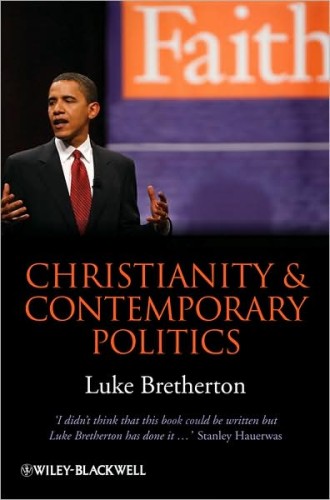Christianity and Contemporary Politics, by Luke Bretherton
I'll be giving Christianity and Contemporary Politics to my graduate students and others seeking to become authors and academics. It is a model of the kind of book a scholar should be looking to write.
Its first merit is the author's choice of subject. How should the church position itself in 21st-century civil society between the twin behemoths of the market and the state? This is no abstract theme. For a host of reasons—not least of them expense—the ubiquitous hand of government-administered welfare is currently out of fashion and is not considered sustainable. It is deemed much cheaper and more effective to harness the local wisdom of organizations that operate closer to the ground—notably churches.
This may be good—or at least affordable—for government, but is it good for churches? Luke Bretherton, convener of the Faith and Public Policy Forum at King's College London, has serious and well-grounded reservations. These questions lie at the heart of the legacy of New Labour in the U.K. and of conservative thinker Marvin Olasky in the U.S. If anyone doubts that this is a timely—indeed, urgent—subject for theological inquiry, I humbly suggest that they haven't been paying attention, or at least they haven't been considering what salvation means in social terms in North Atlantic societies lately.
Read our latest issue or browse back issues.
The book's next merit is Bretherton's command and employment of an impressive range of literature. The focal theological theme of the book is Augustine's notion of the saeculum, the mixed dimension where the heavenly city and the earthly city overlap. Bretherton's treatment brings the questions posed by Augustine vividly and helpfully into the present debates.
Anyone who's tried to work toward a common goal with groups of different faiths and of no faith knows the challenges and rewards of discovering and rediscovering what Augustine calls "common objects of love." Bretherton deftly sets the overarching theme of the saeculum amid an array of theological arguments, positioning it alongside ancient conversation partners such as Irenaeus and identifying its abiding resonance in relation to contemporary voices such as Oliver O'Donovan, Stanley Hauerwas and John Paul II. This is an instance (much trumpeted but seldom fully practiced) of theology in the service of the church.
Even more striking is Bretherton's comfort with secular literature, whether he is thoughtfully summarizing and acutely critiquing the influence of looming figures, such as John Rawls, or deeply engaging provocative and prophetic author-practitioners, most notably the community organizer Saul Alinsky and his immediate disciples. Bretherton is always charitable to those with whom he disagrees, and he is admirably concerned with discerning wisdom rather than scoring rhetorical victories. An ideal book for the classroom not only summarizes and critiques leading viewpoints but constructively advances the argument in new ways. Bretherton does both of these with great facility.
Another merit of the book is that it is predicated on Bretherton's sustained personal involvement and investment in the issues. Bretherton, again admirably, does not make much of this: it emerges in stray footnotes and is hinted at in the preface. But he is undoubtedly sharing with a wide audience the gleanings he has taken from many years' commitment to personal presence within just the kinds of coalitions in the saeculum that the book analyzes. How inspiring to a young academic or layperson committed to community activism to find a scholar who not only puts his personal time where the logic of his mental energy suggests it should go, but also finds in ancient and contemporary theological sources answers to, and reframings of, abiding and topical questions that arise from reflective practice.
Matching the integrity of Bretherton's personal investment is the measured quality of his argument. He carefully allows his argument to accumulate. He never parades, exaggerates or forces it, so at each stage it seems modest, even understated—but by the climax it is compelling and utterly convincing. He does this as he moves from local themes (community organizing) to national questions (immigration and refugees) and finally global concerns (political consumerism and fair trade). The later chapters lack the urgency of the earlier ones, but they maintain the argument and offer complementary contexts and examples.
Perhaps best of all, Bretherton doesn't make the effort look difficult. Anyone who's actually written a book (or even a paper for class) knows how many hours of reading, noting, checking, pondering and rechecking goes into a paragraph that begins with words like "The following five developments are currently shaping the relationship between the state and religious groups in the West." Bretherton's scholarship runs deep, but he wears it very lightly. He isn't always the most felicitous coiner of analogies or illustrator of ideas, but overall that mild deficiency only engages the reader more, since what Bretherton offers is not an exquisite essay on the history of ideas, but a thoroughly incarnate reflection on what is going on as churches seek the welfare of the cities in which they are found. There is no obtrusive jargon, no sense that Bretherton is part of some elite clique that is setting the trend for social engagement while the rest of us have to just get it. Bretherton simply offers a step-by-step strengthening of a thesis that by the end becomes unarguable.
His thesis is that churches, in their engagement in politics, should attend to their locality; should concentrate more on activating personal relationships than on seeking legal, bureaucratic or economic leverage; should seek "generative contradictions" to the status quo rather than embracing or opposing the status quo; should perceive mutual association rather than the state or the market as the heart of politics; and should see their ordinary activities, notably worship, as the key determinants of their public life. This is the hinterland that a theologian of Bretherton's sophistication can offer behind what might, for others, be an opaque slogan such as "Let the church be the church." He offers an agenda for pastor and layperson alike, and it resonates with the experience and reflection of many who have given these issues either less scholarly attention or less personal engagement.
What more could one ask for? One thing only: a little more Jesus. What Bretherton's argument points toward, and what his conclusion succinctly summarizes, is a dynamic formulation of the theology of incarnation. Locally rooted; associational, not legislative; structural, not simply humanitarian—these and many similar indicators of faithful witness are descriptors of God's mode of salvation in Christ. The incarnation scarcely gets a mention in this book, but Jesus' incarnate ministry, reflected today in the power of the Holy Spirit, is what this exemplary book is all about.







